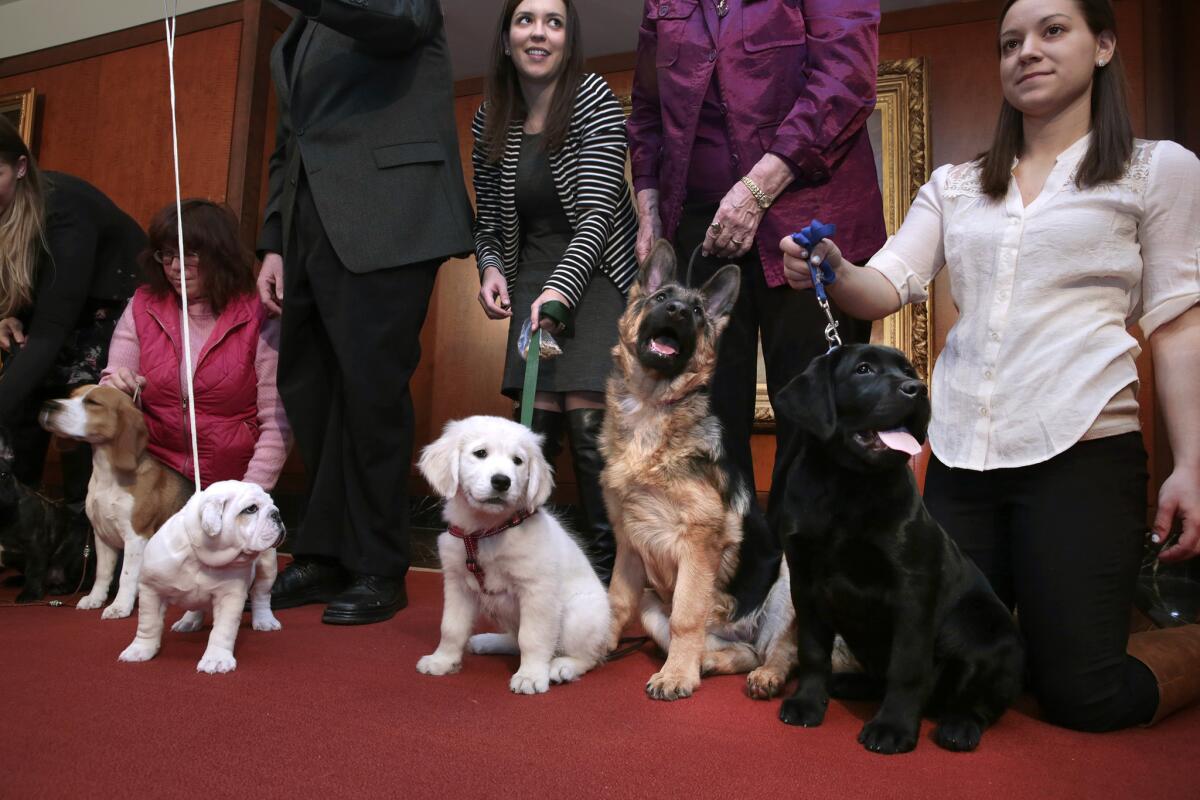Dog domestication saddled man’s best friend with defective genes, study says

Dogs of the 10 most popular breeds in the U.S. appear at an American Kennel Club news conference in February.
- Share via
Dogs may be man’s best friend, but the humans who created them through generations of breeding have saddled them with an excess of detrimental DNA, according to a new study.
For instance, the people who bred poodles to have black coats left many of these dogs with extra copies of a gene called KITLG, which helps determine the pigmentation of skin and hair. Those extra copies of KITLG have also made these dogs more likely to develop squamous cell carcinoma, a type of skin cancer, in their nail beds.
“An associated cost of selection for specific traits in breed dogs is an enhanced likelihood of (inherited) disease,” wrote the authors of the new study, which was published this week in the Proceedings of the National Academy of Sciences. “Considering that many modern breeds have been selected for unusual appearance and size, which reflects fashion more than function, our results raise ethical concerns about the creation of fancy breeds.”
Humans shaped the DNA of modern dogs in several ways along the road to domestication.
First, they created what’s called a population bottleneck by breeding a small number of wild wolves. When the domestication process began as much as 33,000 years ago, people favored the wolves with desirable traits, such as docility or an instinct to help hunters capture large prey.
These early fanciers picked their favorite animals and bred them, a process known as artificial selection. Inevitably, this involved a certain amount of inbreeding. Although inbreeding can cement beneficial traits in a population of dogs, it also locks in whatever troublesome genes the founders happened to have. To make matters worse, the population lacks the genetic diversity it needs to counter the effects of those bad genes.
To see how domestication and the creation of breeds affected the DNA of modern-day dogs, UCLA geneticist Clare Marsden and her colleagues examined the genomes of 46 dogs from 34 distinct breeds. Those genomes were compared with the genomes of 19 wolves (the ancestors of dogs), 25 village dogs (which were domesticated from wolves but not channeled into breeds) and one golden jackal (a more distant relative of wolves and dogs).
The analysis revealed that compared with wolves in general, breed dogs had more DNA mutations that were harmful. However, a few groups of wolves that were especially isolated — such as Isle Royale wolves and Tibetan wolves — had even more of these dangerous DNA changes, according to the study.
The researchers then took a closer look at a selection of genomes in their sample that had been sequenced in the most detail. They found that compared to wolves, breed dogs had 22% more cases of genes that had not one but two copies of a harmful mutation, because it was inherited from both parents.
The scientists also calculated that compared with wolves, breed dogs averaged about 115 more mutations that posed some risk to their well-being. That worked out to a 2.6% bump in these genes.
The results “highlight the costs associated with selective breeding and question the practice [of] favoring the breeding of individuals that best fit breed standards,” the study authors wrote.
The findings aren’t just relevant to dogs (and the people who love them). They may help certain species that are finding themselves increasingly isolated as their habitat shrinks. To keep these populations vital, conservationists should do what they can to make sure the animals maintain a decent-sized population, both in the wild and in captivity. Having a big enough gene pool is more important than preventing inbreeding, the scientists discovered.
Follow me on Twitter @LATkarenkaplan and “like” Los Angeles Times Science & Health on Facebook.







